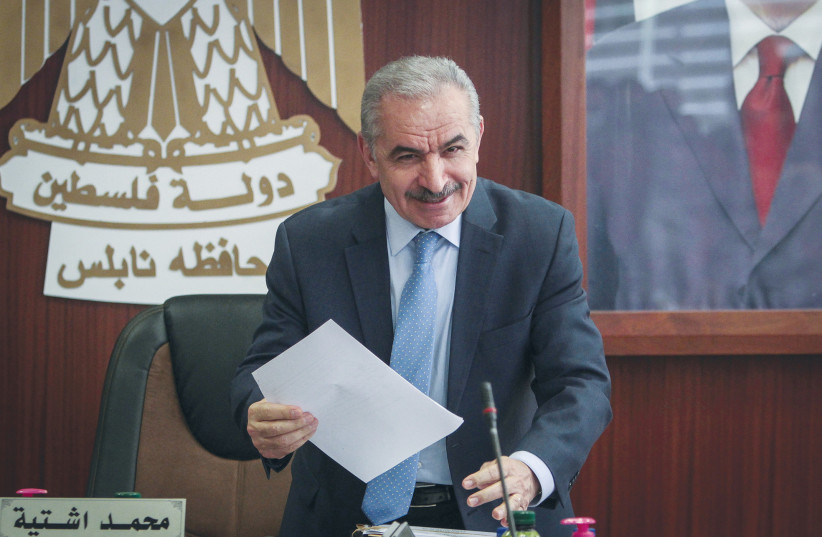
The tragic death of veteran Al Jazeera reporter Shireen Abu Akleh in Jenin on Wednesday morning came as Palestinian Authority Prime Minister Mohammad Shtayyeh was visiting Brussels, where he attended a meeting of the Ad Hoc Liaison Committee, a body whose primary function is to coordinate the delivery of international aid to the Palestinians.
Established in 1993, the AHLC has been meeting at least twice a year under the chairmanship of Norway.
This year’s meeting came amid reports that some of the Western donor countries were refusing to provide additional financial aid to the PA unless it implements major reforms, especially in the field of education. The proposed reforms basically call for changes in the Palestinian school textbooks, which are written by PA professionals whose salaries are directly funded by the European Union.
Shtayyeh went to the meeting with the hope of convincing the donors that the PA was serious about implementing large-scale reforms not only in the education sector, but in other fields, too.
And as in previous meetings, Shtayyeh used the platform to launch a scathing attack on Israel, accusing it of engaging in a “systematic destruction of the two-state solution by allowing settlers to invade the Aqsa Mosque, preventing Palestinians from entering Jerusalem, in addition to field executions and arrests.”

Referring to the severe financial crisis in the PA, the PA premier said that the Palestinians have started recovering from the coronavirus pandemic crisis, and that the Gross Domestic Product rose about 7% in 2021.
“The Palestinian economy suffers from a defect in its structure,” Shtayyeh told the donors. “It is a besieged economy that does not control its resources or capabilities, and it exists in an exceptional situation imposed by the reality of the occupation and its procedures.”
He revealed that the rate of unemployment decreased in the last quarter of 2021 to 13%, after having reached 18% in 2019. This, Shtayyeh said, was due to new job opportunities in the West Bank and work in Israel.
A report submitted to the AHLC by the Quartet, which consists of the US, EU, United Nations and Russia, noted that the PA continues to face a dire financial situation resulting from diminished economic growth, a marked decline in donor funding and Israeli deductions from clearance revenue (in response to payments made by the PA to families of Palestinians involved in terrorist attacks against Israelis). In 2021, the PA’s deficit reached $757 million – approximately 4.4% of GDP – despite GDP growth of 6%, an increase in gross local revenues of $1.5 billion and a decrease in government expenditure. During the same year, deductions by Israel from clearance revenues reached $282m., representing 37% of the budgetary deficit.
“Projections for 2022 by the PA portray a similarly grim fiscal situation,” according to the Quartet report. “Despite projecting 3% growth in GDP and 8% in gross revenues, the PA’s fiscal deficit is expected to reach $558m. Addressing that gap will require structural change, internal fiscal reform, improved economic growth, and the resolution of a number of long-discussed but still outstanding Israeli-Palestinian fiscal files.”
Shtayyeh presented to the donors a plan that includes 21 steps for reforms related to administrative, financial, security, social and economic issues.
“Whatever reforms we make, they alone are not sufficient to address the imbalance in the Palestinian economic structure, because it is under occupation,” he argued. “Therefore, Israel must take measures on its part, and the support of donor countries must continue to enable us to continue fulfilling our obligations.”
Shtayyeh did not refer to the issue of anti-Israel incitement. But the plan he presented to the donor countries argued that, as part of the reform process, the PA will work toward promoting and protecting the Palestinian national narrative and culture.
“Information about Palestine is being deliberately distorted by the Israeli occupying authorities, and, as part of this process, Palestinian folklore, heritage and archaeological artifacts are being stolen,” the plan stated. “A battle is being waged over the narrative dominating the conflict. It is important that our national culture, grounded on the Palestinian identity, should be consolidated and protected.”
THE NEWS OF Abu Akleh’s death came as Shtayyeh was meeting with Roberta Metsola, president of the European Parliament, and other EU officials on the sidelines of the AHLC meeting.
The widespread condemnations of the incident have since been used by Shtayyeh and other Palestinian officials to garner additional support for the Palestinians’ case, promote the Palestinian narrative, and shift the blame onto Israel. The ultimate goal: to ramp up the narrative according to which the Palestinians are the “victims of the Israeli occupation.”
In a statement from Brussels, Shtayyeh wrote that “Shireen was killed by the Israeli occupation while documenting their horrific crimes against our people.”
He later urged the senior EU officials to pressure Israel “to stop all its unilateral measures and violations against our people and to allow the holding of elections in occupied Jerusalem.”
It’s not clear at this stage whether Shtayyeh was successful in persuading the donor countries to resume or increase their financial aid to the Palestinians. The killing of Abu Akleh may significantly contribute to the Palestinians’ diplomatic and media warfare against Israel, but it will not necessarily bring more money into the coffers of the PA.
The Europeans and other Western donors have, at least in the past few years, been exerting heavy pressure on the PA to end the incitement and tone down its rhetoric against Israel.
For now, it’s evident that the pressure has proven to be ineffective.
In fact, it seems that matters have been going in the opposite direction. The voices and messages emanating from Ramallah and the Hamas-ruled Gaza Strip have become even more toxic, as evidenced before and during Ramadan.
Allegations that Jewish settlers are “storming” and “desecrating” the Aqsa Mosque during their tours of the Temple Mount are sounded almost every day in the West Bank and Gaza Strip. Senior PA and Hamas officials don’t miss an opportunity to accuse Israel of planning to “commit crimes” against one of Islam’s holiest sites, Jerusalem, and the Palestinian people.
Against this backdrop, terrorist attacks were carried out in Beersheba, Bnei Brak, Tel Aviv, Elad and Jerusalem. The attacks, which resulted in the deaths of 19 people, are said to be connected, directly and indirectly, to the tensions at the Temple Mount and Jerusalem.
Yet, just as the tensions and violence appeared to be fading away, the incident involving the popular Al Jazeera journalist took Israel and the Palestinians back to square one. The PA, Hamas and other Palestinian factions and parties are now using the tragedy to further whip up anti-Israel sentiment among the Palestinians.
The protests against the killing of Abu Akleh are likely to continue in the coming days and weeks. The protests, which coincide with the first anniversary of the Israel-Hamas war, could escalate during the Palestinians’ annual commemoration of Nakba Day on May 15 in protest against the establishment of Israel.
The PA is now hoping to turn the tragedy of the reporter into a new version of the incident involving Mohammed al-Durrah, the 12-year-old boy who was killed in the Gaza Strip in 2000 after being caught in a crossfire between the IDF and Palestinian security forces.
The main goal is to increase the international pressure on Israel to halt all its practices in Jerusalem and the West Bank, including construction in the settlements and security measures at the Temple Mount.
The PA’s efforts are directed mainly toward the US and the EU.
PA President Mahmoud Abbas wants the Biden administration to “end its silence” and increase its involvement in the Israeli-Palestinian conflict.
He wants the Biden administration to exert crushing pressure on the Israeli government to stop all IDF “incursions” into Palestinian cities and villages. He also wants the Biden administration to fulfill all its promises to the Palestinians, especially the commitment to the reopening of the US Consulate in Jerusalem.
On the other hand, Abbas and his officials want the EU and other Western donors to unconditionally resume their financial aid to the PA.
Meanwhile, there’s growing concern in Ramallah over the rising influence and popularity of Hamas and Palestinian Islamic Jihad in the West Bank. While it’s true that the IDF crackdown on Hamas and PIJ members serves the interests of Abbas, it nevertheless underscores the weakness and alleged collaboration of the PA with Israel. Each IDF operation and each killing of a Palestinian further erodes the Palestinian public’s confidence in Abbas and the PA.
For now, all eyes in Ramallah are set on the upcoming visit of Biden to the region.
The PA is hoping that Biden will carry with him a number of gifts for the Palestinians. The talk about the possibility that the US president may visit a hospital in east Jerusalem without the presence of Israeli security officers has already sent a positive message to the PA – namely, that the US considers east Jerusalem as the capital of a future Palestinian state.
But the PA knows that a visit to a hospital carries more symbolism than substance, which is why Abbas has made it clear that he expects the Biden administration to “translate its words into deeds” and fulfill all its promises to the Palestinians without delay.
Abbas’s main message to the Americans and Europeans is: Submit to my demands, or the Palestinian Authority will collapse, and you will have a Hamas takeover of the West Bank.







